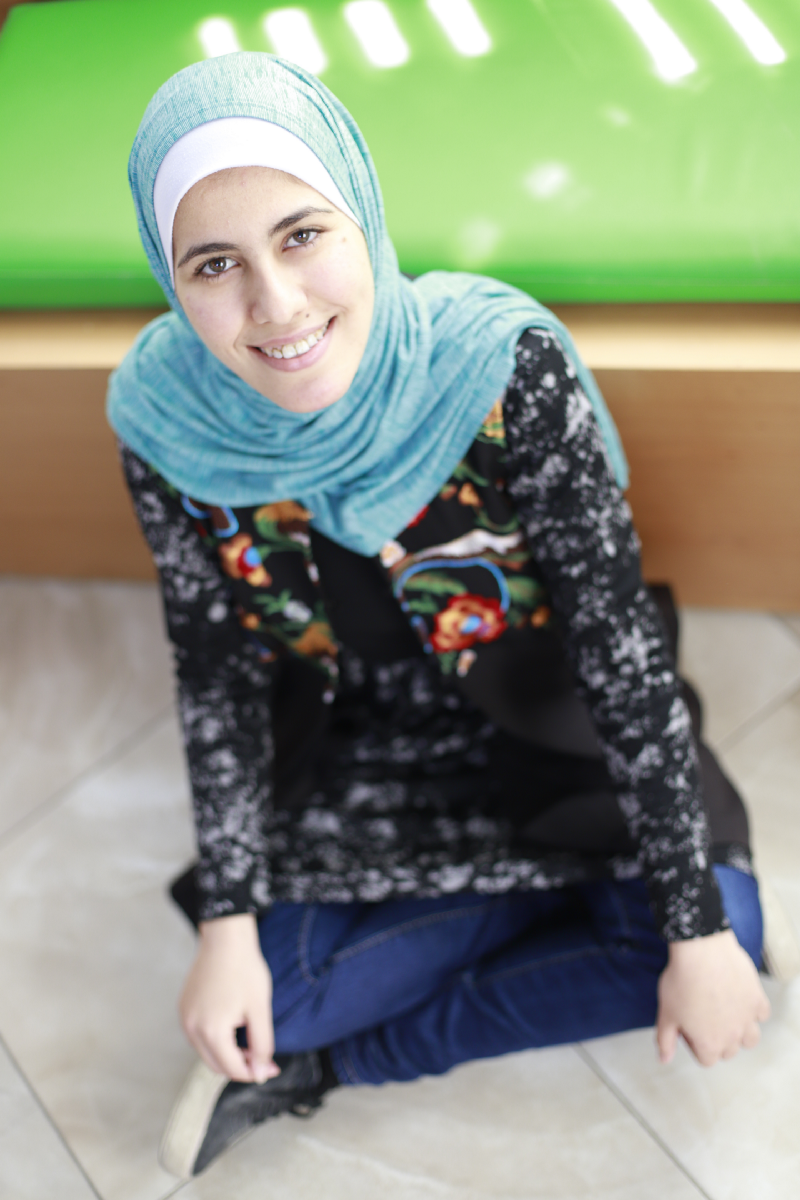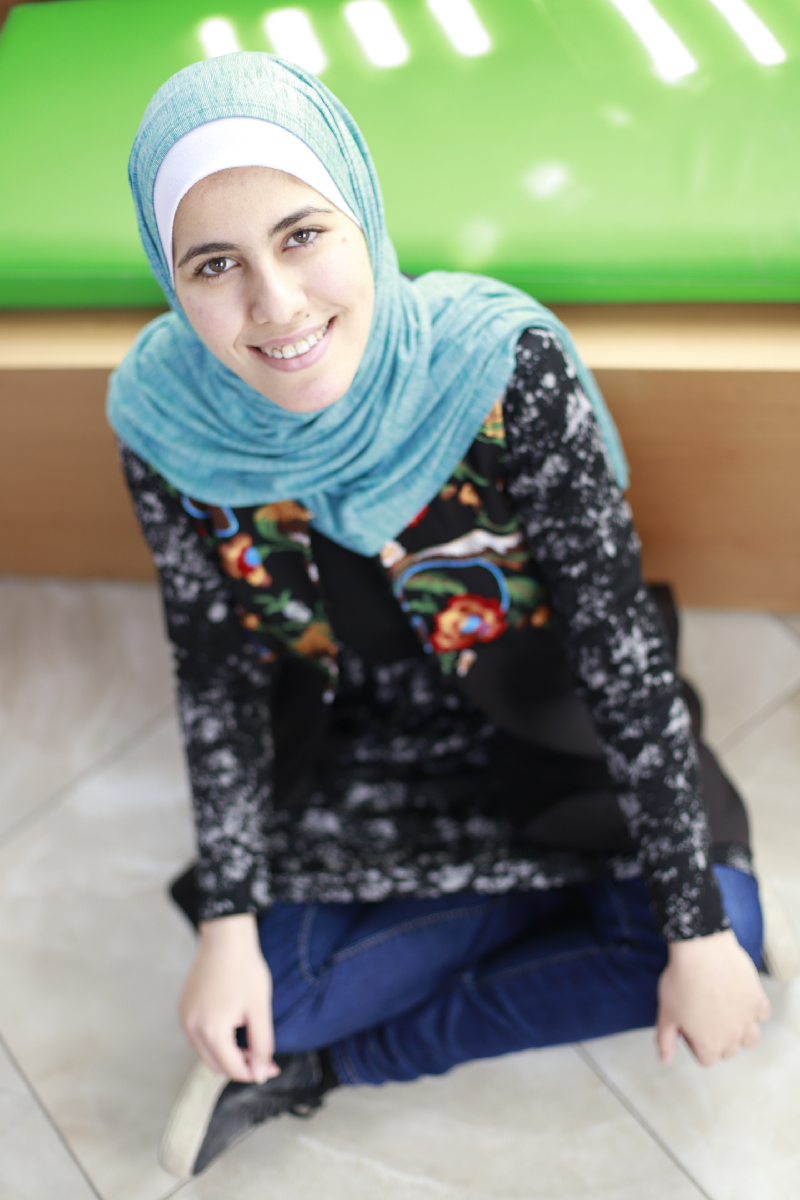By Rebecca Radding
Former Gaza Code Academy facilitator Yasmin Hillis, a self-declared hippie at heart, talks about how Virginia Woolf inspired her to begin writing code
Yasmin Hillis studied English literature and taught English to children before shifting gears and studying web development with Founders and Coders, a peer-led coding bootcamp, where she recently finished her term as course facilitator. For several years, she’s been an avid practitioner of meditation and vegetarianism. In her spare time, Yasmin volunteers for local nonprofits and is teaching herself mathematics.
If Yasmin lived in London, where Founders and Coders is based, her story as a self-taught female programmer would still stand out. But the fact that Yasmin was born in Gaza, the most populous of the Gaza Strip’s five governorates, makes her accomplishments, and her relentless positivity, all the more extraordinary. In fact, with the Israeli border crossing mostly closed since 2007, and the Egyptian border crossing effectively closed since 2014, Yasmin has never left Gaza, a narrow strip of land just 25 miles long.
Yasmin, who graduated from the Gaza Code Academy, a joint project of Gaza Sky Geeks and London-based Founders and Coders, grew up under the thumb of the blockade, in circumstances most aspiring developers can hardly fathom: Gazans have, on average, only four hours of electricity a day, and 90% of Gaza’s water is unsafe to drink. According to the World Bank, Gaza’s unemployment rate, 43.9%, is the highest in the world. Unemployment among women stands at 55.2%, and workforce participation by women is just 19.7%.
Rebecca: Yasmin, I understand that before you decided to become a web developer, you studied English.
Yasmin: That’s right. I graduated from Al-Azhar University in 2016, where I studied English literature and fell in love with literary criticism, especially of poems by William Wordsworth.
When I finished, I worked as an English teacher for a number of organisations and for a summer camp organised by Amideast.
Rebecca: Reading novels in your second language isn’t for the faint of heart! Tell me about your first experience reading a novel in English.
Yasmin: Actually, it was Robinson Crusoe.
Rebecca: Your first novel in English was an about a man shipwrecked on a desert island?
Yasmin: I know, ironic, right? When I read about his life on the deserted island, his experience being cut off from society, I felt like every sentence could have been describing me. Maybe that’s what motivated me to persevere through the book. After reading the first two chapters, and looking up every other word in the dictionary, I resolved to sit for twelve hours a day with my nose in the book until I felt like I understood the whole story, and not just the individual words. It took me two weeks, but I did it!
Rebecca: You mentioned that you fell in love with Wordsworth’s poetry during university. Do you have a favorite poem?
Yasmin: It’s so hard to choose, but probably “I Wandered Lonely as a Cloud (Daffodils)” by Wordsworth. When I read it, I feel like I’m right there with him in the field of flowers, even though I’ve never visited a daffodil field myself before. His writing…it gives me the sense that I can smell something I’ve never smelled before, and it lifts me up whenever I’m feeling down and longing to connect with nature. The final stanza particularly resonates with me:
“They flash upon that inward eye
Which is the bliss of solitude;
And then my heart with pleasure fills,
And dances with the daffodils.”
Rebecca: So help me understand how you went from reading novels to writing code.
Yasmin: As a literature student, I spent lots of time searching the web for answers to the seemingly infinite questions sparked by the novels and literary criticism I was reading. At some point I realised that the websites I was using for my research had themselves been built by software engineers. Something inside me whispered, “Be the builder,” so I decided to take a gamble on learning to code.
Not long after, I saw an advertisement for She Codes, a short-term course run by Gaza Sky Geeks, on social media, and signed up right away. I joined the course and immediately started learning everything I could about coding, spending most of my free time reading articles and watching YouTube videos about programming as I worked my way through the prerequisites for the Code Academy.
I still remember how in my interview to join the Code Academy, after the technical questions, one of the panelists asked, if I could invite anyone to dinner, who would that person be. I said Virginia Woolf because from her novels you can see how enlightened she was in a time when women had so many rules imposed upon them by society, and as a fellow feminist living in a traditional society, I find her really inspiring.
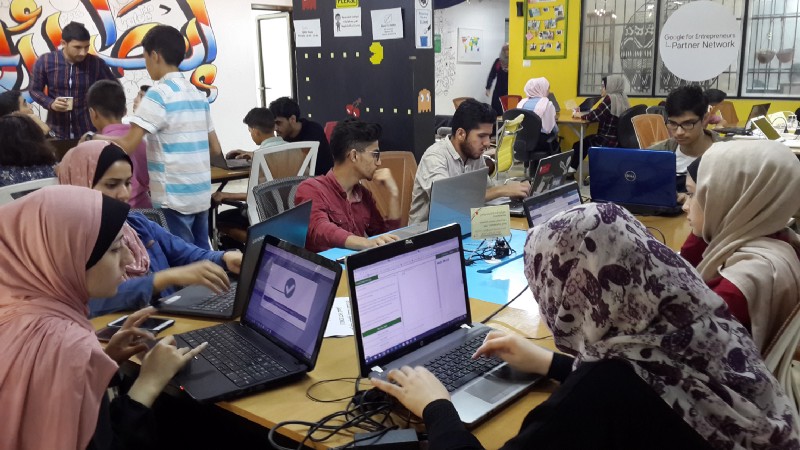
Rebecca: Obviously you’re not one to let rules stand in your way! Tell me about your experience on the course as someone with a non-technical background.
Yasmin: In the beginning, I had a hard time coping with so many new technical topics, especially since everyone else on my cohort had studied computer science or information systems. But one thing I did know how to do was to google, and I spent every scrap of time looking up the new terms and topics I encountered.
There were times when learning code felt like learning another language — something I’m familiar with, having learned English and conversational French. But I had a hard time wrapping my mind around concepts like code modularisation, because I just couldn’t accept the idea that a certain block of code is getting/sending its input/output from/to another block of code living somewhere else on the project.
Maybe it’s because in literature we don’t have the same concept — we usually deal with the piece of literature as a whole. So, coming to programming and finding that some files depend on others — my head was spinning!
Rebecca: I take it eventually things got easier. How did you find your footing?
Yasmin: It all comes down to peer-led learning. Unlike traditional learning methods, which focus on what students lack, peer-led learning gives us as learners the responsibility to teach each other. Through this process we also become more self-aware of our strong and weak points. Peer-led learning has taught me that no matter how much I know, I can always learn something from the process of working with someone else.
Rebecca: I’d love to hear about your first experience with peer-led learning.
Yasmin: My first experience with peer-led learning was during a pair programming exercise on the very first day of the course. The mentors paired us up and told us to work on a challenge on Codewars. I remember how just three days before the course started, I was working at home on a similar challenge, and it took me ages, and so much searching, to find the answer. When I paired, my classmate used a different pattern, naming the variables and dealing with the code in a way that helped me see the problem in a new light, and we got to the solution in a fraction of the time it had taken me before. Afterwards, I remember telling our mentors that when two minds focus on one single problem, there’s nothing we can’t solve.
Rebecca: And what was the best part of the course?
Yasmin: Our final project, which we worked on while mentoring the following cohort, was hands down the highlight of the course. We built an application to showcase the portfolios of Founders and Coders students, with Joe Tanner, Founders and Coders commercial manager, as our client.
Rebecca: Speaking of technical skills, in what ways would you say that coming from a non-technical background was an asset on your journey?
Yasmin: It’s interesting you ask that. I guess you could say I brought the ability to think through projects both technically and emotionally, you know, from the user’s perspective. Some of my classmates, who were so strong technically, would forget to think through the project from the perspective of the user.
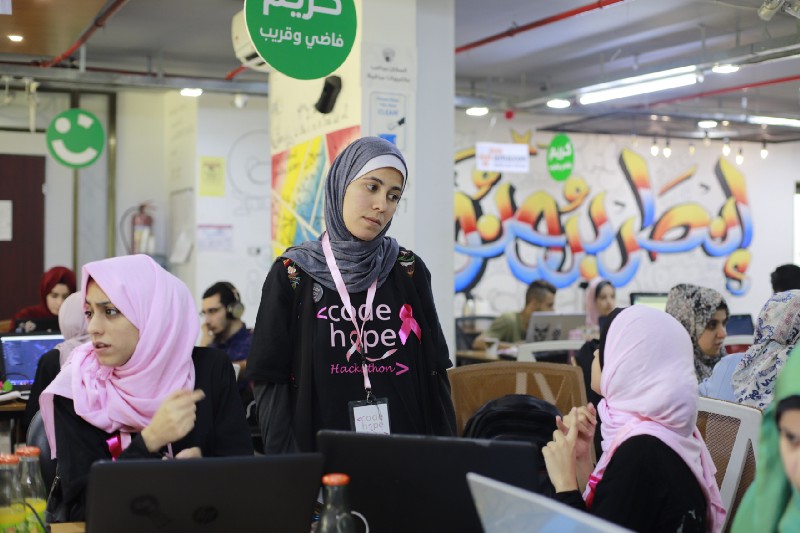
Rebecca: You mentioned that you worked on this project while mentoring the next cohort. Many of our alumni say that they grow as much, if not more, while mentoring as they did when they were a student. Tell me about your experience as a mentor.
Yasmin: Mentoring taught me so much, starting with the fact that the best way to learn something is by explaining the concept to someone else. I remember standing up in front of the class explaining something about Node, even though I still hadn’t figured out the logic behind it myself. During my explanation, one of the students stopped me and asked me a question to the tune of, “Why does it work that way?” I found myself providing the answer and noticed another student nodding and saying, “Yeah, that’s right.” So I went back to my searching and saw that the answer I came up with, on the spot, was actually the right one.
Just yesterday, I was at home working through a mathematical problem. I found the problem hard and just could not find a solution to it, so I went to my mom, my mentor in self-learning math. I told her, “Mom, I can’t find a solution to this problem!” She asked me to explain the problem to her before thinking together about a solution. Lo and behold, as I was explaining the problem to my mom, I found the solution.
Rebecca: You said your mother is your mentor in self-learning mathematics. Would you consider her a role model?
Yasmin: Absolutely. My mother studied mathematics at IUG, Islamic University of Gaza, and is currently a teacher of mathematics for middle schoolers at a school for UNRWA in Gaza.
I guess it’s no accident that I became first a teacher, and then a facilitator. You could say that education is kind of a family tradition. My grandfather, rest in peace, who is originally from Gaza, studied English literature in Egypt before returning to Gaza to work as English teacher. He was eventually promoted to school principal, and then served as director of the UNRWA Education Department, Gaza area. My grandmother is also a teacher at an UNRWA school.
Having a strong female role models has been essential in my journey, as so many people here think women aren’t smart enough for work in tech.
Rebecca: Tell me about these naysayers.
Yasmin: Well, the dominant view in our society is that women are not made for tech and mathematics and science, and to put it bluntly, that women just aren’t intelligent. After growing up hearing this, some women even start to believe this and behave like it’s true. I’m grateful that my family has been so supportive of my educational and professional aspirations and that I have strong women as role models in my mother and grandmother.
Rebecca: I understand that while there are only a handful of women working as developers in Gaza, women make up half of the students at the Code Academy.
Yasmin: That’s right. We believe that women and men are equally well-equipped for technical work, and envision a Gazan tech sector that one day employs as many women as men.
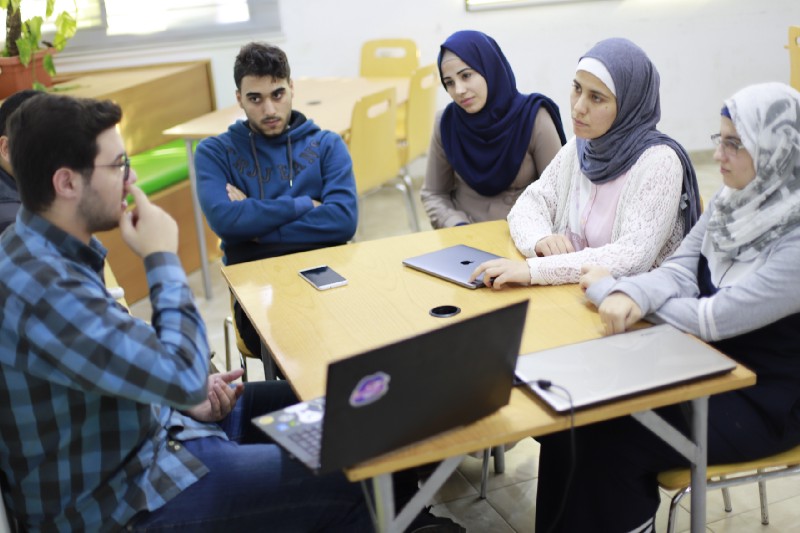
Rebecca: You were the course facilitator for the fifth cohort of the Code Academy, which began during summer 2018. In your experience, how is facilitating different than teaching?
Yasmin: Interesting question. Teaching is about delivering an idea. Facilitating, on the other hand, is mostly about observing — we only intervene when we don’t think students can sort things out for themselves, or when one student’s actions have become harmful to themselves or others. As a facilitator, I pay close attention to the environment and the students’ personalities, and make adjustments accordingly.
Being a facilitator was by far been the most rewarding thing I have ever done. I was once floating around the room when students were working in pairs during a workshop. I noticed one student seemed particularly stressed and anxious. I approached her and asked what’s the matter but she assured me everything was fine. During the break, I decided to talk to her privately. This time, she admitted to me that she felt like an imposter, like she didn’t belong on the course and in the tech industry (which of course wasn’t true). I offered her advice and emotional support, which she later followed. A few weeks later, at the final project presentation, she displayed a firm grasp of the project as a whole. After the presentation, I talked to her and was so proud to hear her tell me she felt like she’d grown both personally and professionally.
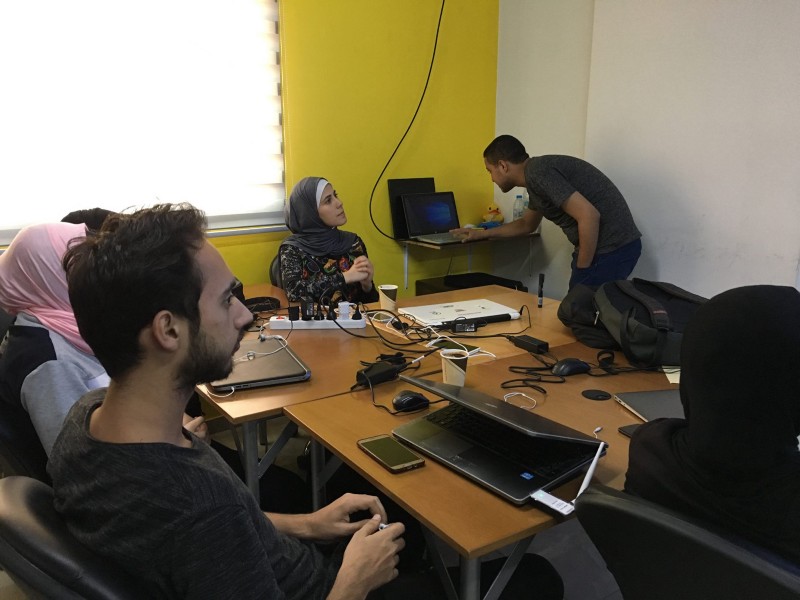
Rebecca: And how did you grow from your experience as a facilitator?
Yasmin: Even more than when I was a student, facilitating has taught me the value of teamwork. Now I’ve been a team member several times before, but witnessing how teams in the room work and observing where they get into trouble has made me so much more aware of the importance of collaboration and communication.
When you are on the team, you can get overwhelmed by the tiny things in front of you and forget to pay attention to more important things. When you are someone who is observing team dynamics, you can more clearly see the big picture, and thus help the teams refocus during daily standups on projects. I frequently remind the classroom as a whole that paying attention to the big picture is important. Sometimes the big picture is the communication within the team. Sometimes it is maintaining the longevity of relationships and other times it is prioritizing the project and the learning process of others.
More than anything, this job taught me to be more patient. I learned to be patient with the rate of student progress, with team dynamics, with students who make the same mistake more than once. In life in general, I’m patient with my mind and body. I remind myself that everything takes time and if everything happens instantaneously, life loses one of its most interesting characteristics, suspense.
Rebecca: You say you’re patient with your mind and body. Outside of facilitation, how would you say you’ve learned the value of patience?
Yasmin: I’ve actually been practicing meditation for four years now. I’ve learned so much from my meditation practice, like how not to complain, compassion, patience, and self-awareness.
Rebecca: How did you get started with meditation?
Yasmin: Well, back in college, during exams, I was just so overwhelmed. I had the sense that my mind needed a rest, but I didn’t know how to provide that for myself. It felt like there were voices in my head, and they were fighting, but I couldn’t figure out how to quiet them down.
I decided to sit in my bedroom, on the floor, and close my eyes — instinctively, I think, we all know how to be mindful. I sat there, still and silent, for about fifteen minutes. When I finished, my mind felt more organised, I was calm, and my mood had improved. When I went to study I found my comprehension was so improved that I decided I had to research to find out what it was that I did.
I found a YouTube video with instrumental music for relaxing and I continued with meditating for a few months, almost every day, and eventually I learned about how controlling your breathing makes it easier and faster to relax and improves the mood. I still meditate whenever I can, using music, guided meditation, or mindfulness apps like Calm and Headspace. To be honest it’s hard to find a place to be alone and meditate, because houses here are crowded. But I steal moments for myself, because if I want to practice meditation and connect with nature, it doesn’t have to be a special place or time, just any place or time that I need it.
People here think I’m crazy for meditating, but what can I say, I guess I’m just a hippie at heart.
Rebecca: So where do you go when you want to be alone, to relax or to study?
Yasmin: Growing up, my favorite place to study was the balcony of my bedroom in our old house, where I’d read and sip a cup of tea in the fresh air. Today, I’d have to say I love visiting the sea. It’s where I feel relaxed, rejuvenated, and connected to nature.
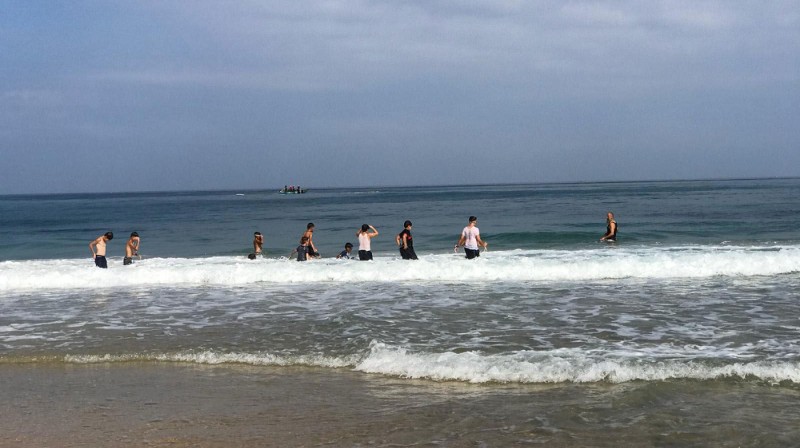
Rebecca: What about your career goals? What’s your dream job?
Yasmin: I loved working with the team at Gaza Sky Geeks, and I’m now looking for a role as a developer on an equally well-functioning team. I’d like to keep doing some project management, as I enjoyed the organisational aspect of facilitating.
Rebecca: Dream big for me. Imagine the blockade ends today and you can get a job anywhere in the world. Where would you go?
Yasmin: LONDON, of course!
To learn more about hiring developers in Gaza, visit agency.gazaskygeeks.com.
To apply to the Gaza Code Academy, visit www.gazaskygeeks.com/code.
